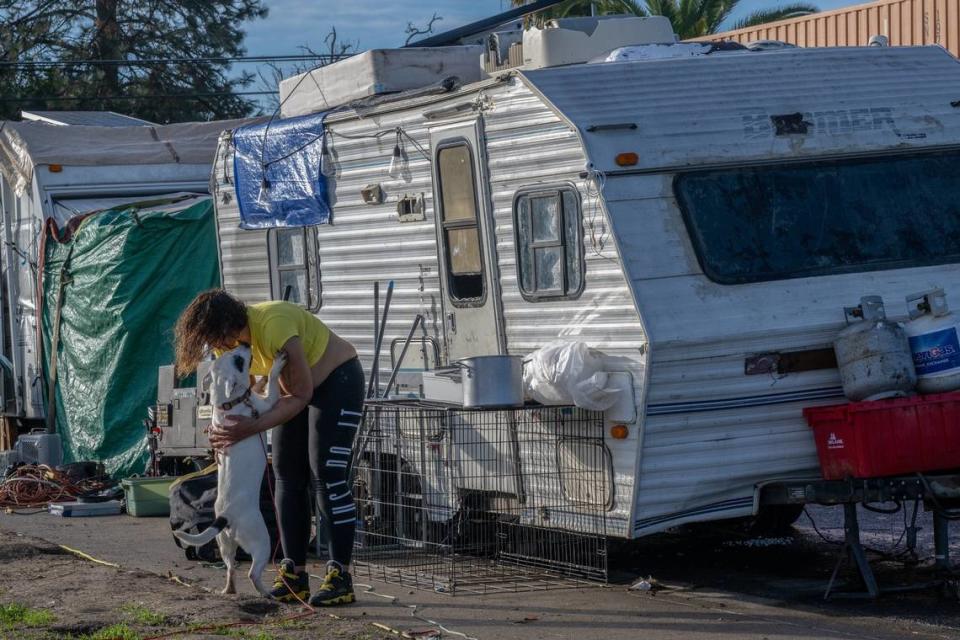Sacramento officials wished homeless a merry Christmas — then said they’d soon be evicted
Two city workers stopped by a small encampment this week, wished a close-knit group of homeless people a merry Christmas — and informed them that if they didn’t move soon, their mobile homes and all the belongings in them would be impounded.
Their vehicles hadn’t been tagged yet on Thursday morning, and so a group of seven people living on Opportunity Street were consumed with fear and uncertainty.
Nicole Stuart, who lives in one of the six trailers in what she called their convoy, said that the code enforcement officer who came to the camp Wednesday did not mention any services or tell them where they should go.
Stuart said that staff from the Front Street Animal Shelter provide better services for her dogs than the city and county provide for homeless humans. Her trailer was parked next to a vacant lot, across from a truck rental business in North Sacramento’s Oak Knoll neighborhood.
“They keep kicking us further and further out,” Stuart said. “Where are we supposed to go?”
A spokesman for the city of Sacramento, Tim Swanson, confirmed that an outreach worker from the Department of Community Response and a code enforcement officer visited the encampment on Tuesday. He said that people in the encampment were offered spots at the Outreach and Engagement Center, a short-term shelter; and Miller Park, a tent and vehicle encampment run by a nonprofit, on Tuesday.
A code enforcement officer returned to the encampment Wednesday. Some vehicles on the street were tagged, Swanson said.
The threat of the Opportunity Street eviction, commonly referred to as a sweep, rattled the group of mostly women, who have come to see themselves as a family. Usually, the group’s leader, Traci, 62, would use her Dodge Tacoma to tow the RVs to a new street. But something is wrong with the truck — she thinks it needs a new battery — and she said her disability income doesn’t come in until next week.
If the members of the camp can’t find a way to move their homes, Stuart and Traci said, they’ll lose everything.
“If they come and take all of our trailers, what, you’re gonna put us back in tents?” Stuart said. “That’s even worse.”
These women have been ensnarled in the city’s attempts to address a worsening homelessness crisis. The county has said that for every one person who exits homelessness in Sacramento County, three more people become homeless.
Across the street, Nicole Casper scrambled to prepare for a forced move. “This is stressful,” Casper said, “not knowing if they’re coming.”
Traci, whose last name is being withheld because she does not want individuals from her past to be able to find her, said that the close-knit group had been together for the better part of a year. She estimated that they had been forced to move 14 times.
The Sacramento Bee has previously reported on the pitfalls of these encampment evictions. Massive sweeps on Roseville Road over the summer caused Sacramento County to lose track of almost every one of the 200 homeless people it said would be helped by a new $1.3 million “safe stay” parking lot in North Highlands.
Sweeps have continued in Sacramento despite their debatable legality. A 2018 9th U.S. Circuit Court of Appeals ruling in Martin v. Boise demands that “as long as there is no option of sleeping indoors, the government cannot criminalize indigent, homeless people for sleeping outdoors, on public property, on the false premise they had a choice in the matter.”
In this instance, Swanson noted Thursday, these evictions fell under the city’s vehicle code.
Still, Sacramento County does not have nearly enough emergency shelter beds for its unsheltered homeless population: it falls more than 6,000 spaces short. According to the last federally mandated point-in-time count, there were 9,278 homeless people across the entire county, which has fewer than 3,000 emergency shelter beds.
No matter what happens, Stuart said, they won’t let themselves be split up. “We all move together,” she said. “When we move, we have to find a spot for everybody.”
Stuart called Traci her “street mom” and said that the older woman cooks dinner for them most nights.
On Wednesday, it was chili cheeseburgers and potatoes. Traci said she feels a moral obligation to provide what little she can for her community.
“I will make sure that they eat,” she said. “A soup kitchen? No. A place they can get some peace? Yes.”
She said that many people who aren’t homeless “don’t know how close it could be. They don’t know what kind of tragedy could strike them. They have no right whatsoever, who are living in little homes, you don’t know who’s gonna die the next day, because tomorrow’s not promised.”
With Christmas just days away, Stuart, Casper and Traci were panicking. They said they knew they couldn’t count on the city for resources.
They just had to cling to each other.



